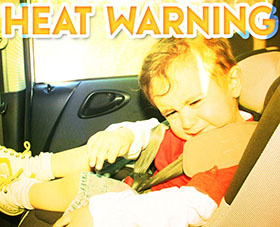Take Caution About the Heat

The New Mexico Department of Health and the Children, Youth and Families Department (CYFD) advise New Mexico residents to take extra precautions to avoid heat-related illnesses such as heat exhaustion and heat stroke and to be extra vigilant to not leave children in vehicles. Temperatures over the next several days are expected be the warmest days of the year so far.
People at highest risk of heat related illnesses are the elderly, the very young, and people with existing chronic diseases such as heart disease, and people without access to air conditioning. The very young are particularly vulnerable to heatstroke after being left in hot cars.

The National Highway Traffic Safety Administration (NHTSA) reports in 52 percent of cases where children died due to heatstroke in America between the years 1998-2013, the caregiver reported “forgetting” the child was even in the vehicle.
“It may be tempting not to ‘wake the sleeping baby’ for a quick trip inside the store, but the fact is young children are at greater risk for heatstroke than adults,” said Department of Health Cabinet Secretary, Retta Ward, MPH. “Their bodies heat up three to five times faster than adults, and anyone can become ill from heat if their body can't compensate for it and properly cool them off.”
Two children have died in New Mexico from heatstroke after being left in hot cars over the last five years. In the United States, heatstroke is the leading cause of non-crash-related deaths in vehicles for children 14 and younger.
“There should never be a reason to leave a child alone in a car,” said Children, Youth and Families Cabinet Secretary Yolanda Deines. “Now that temperatures are spiking, we need to be very aware of what we have in our back seat, especially when it is our children who are the most vulnerable.”

CYFD and the Safe Kids Worldwide encourage New Mexicans to help reduce the number of deaths from heatstroke by remembering to A.C.T.
A: Avoid heatstroke related injury and death by never leaving your child alone in a car, not even for a minute. Make sure to keep your car locked when you are not in it so kids don't get in on their own unattended.
C: Create reminders by putting something in the back of the car next to your child, such as a purse, briefcase or cell phone that is needed at your final destination. This is especially important if you are not following your normal routine.
T: Take Action. If you see a child alone in a car, dial 911. Emergency personnel want you to call. They are trained to respond to these situations. One call could save a life.
Remember, even young and healthy people can get sick from the heat if they participate in strenuous physical activities during hot weather. The Department of Health and US Centers for Disease Control and Prevention (CDC) advises you to take these steps to prevent heat-related illnesses, injuries, and deaths during hot weather:
- Stay cool indoors; do not rely on a fan as your primary cooling device.
- Drink more water than usual.
- Avoid alcohol or liquids containing high amounts of sugar.
- Replace salt and minerals.
- Wear lightweight, light-colored clothing.
- Schedule outdoor activities carefully.
- Pace yourself.
- Monitor people at high risk.
- Do not leave pets or children in cars.
More information on heat-related illness can be found in the Heat Stress - Environmental Public Health Tracking section of the Environmental Public Health Tracking website.
Media Contact
We would be happy to provide additional information about this press release. Simply contact David Morgan at 575-528-5197 (Office) or 575-649-0754 (Mobile) with your questions.

